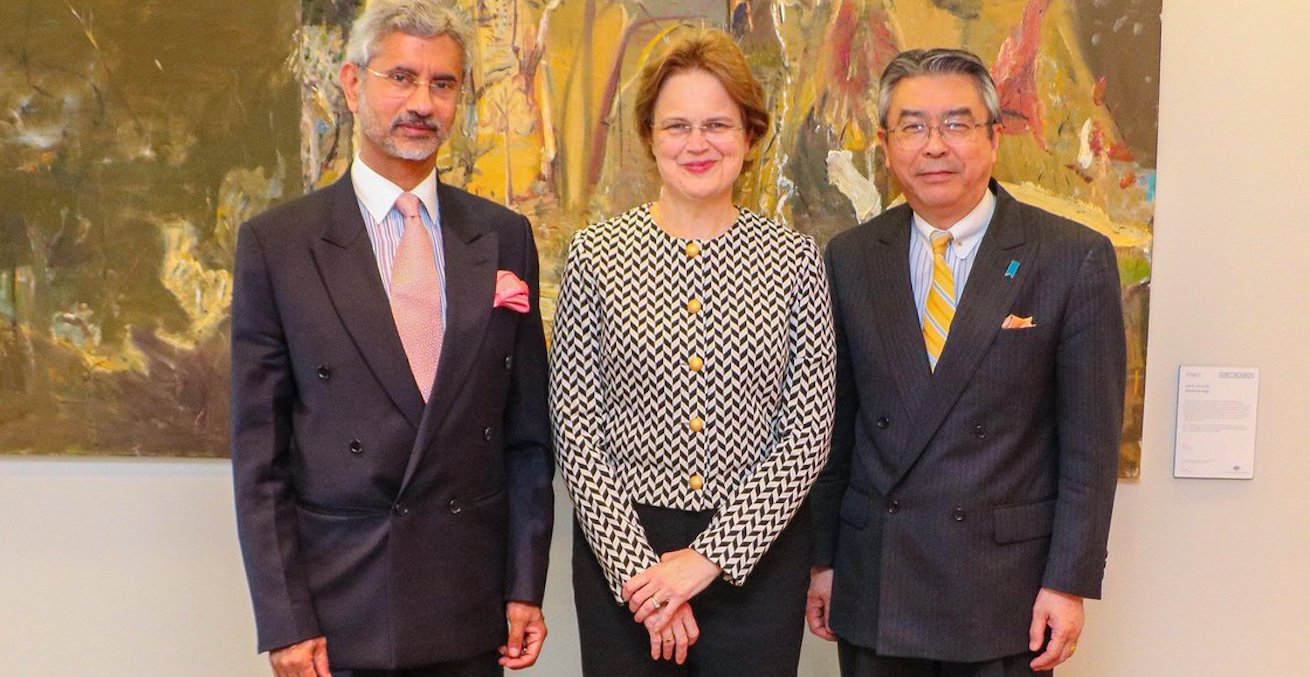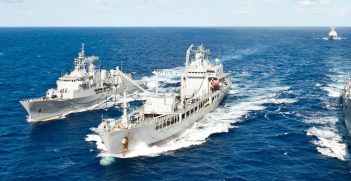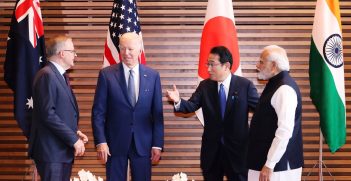Trilateral Diplomacy: Australia's Indo-Pacific Strategy

In the rapidly changing Indo-Pacific region, Australia could enhance its trilateral engagement with Indonesia, India and Japan by taking advantage of the convergence of strategic interests. Diplomacy will be key.
Converging economic and strategic power in the Indo-Pacific is drawing Australia closer to its regional partners, Indonesia, India and Japan. This comes at a time of relative uncertainty about the United States’ willingness to invest strategic capital in the region beyond the Korean Peninsula. It means Australia has an important role to play with its partners in advocating for an ongoing US Indo-Pacific commitment.
In this context, there are real opportunities for Australia to deepen its diplomatic relationships with its key regional partners, including Indonesia, India and Japan, and there are a multitude of economic and security reasons why Australia will benefit. As more of the region’s governments are able to project their power beyond their national borders, such engagement will help manage the risks of strategic miscalculation and instability. So, in this period of disruption, what practical initiatives can Australia take to promote active and confident diplomacy?
One option is to establish and upgrade formal trilateral arrangements with the three aforementioned Indo-Pacific powers.
Australia’s approach to Indo-Pacific security is already supported by its Trilateral Security Dialogue with the US and Japan. This was established in 2006 and is based on mutual strategic interests and shared values. As Australia engages at a closer level with Indonesia, India and Japan, there will be opportunities to work with the trio in similar small groupings.
While multilateral fora, such as the East Asia Summit, the Association of Southeast Asian Nations (ASEAN) Regional Forum, Asia-Pacific Economic Cooperation (APEC), and the Indian Ocean Rim Association (IORA) remain the premier forums for Australia’s Indo-Pacific diplomacy, formalised trilateral arrangements with Jakarta, Tokyo and New Delhi would add another layer of engagement where cooperation on specific areas can be organised and accomplished.
Converging interests
Australia and Indonesia have developed a resilient relationship, where shared interests now rise above the frictions that can be attributable to close geographic proximity. The 2006 Lombok Treaty, and the later joint understanding on its implementation, affirm the two countries’ commitment to common partnership. Australia and Indonesia now collaborate in regional dialogues as co-chairs of the Bali Process, co-chairs of the inaugural Sub-Regional Meeting on Foreign Terrorist Fighters and Cross Border Terrorism, and sequential chairs of the rejuvenated IORA. Australia recognises how important Indonesia is to the fabric of its foreign relations and, as a statement of intent, its diplomatic mission presence has doubled in the last few years with the establishment of consulates in the economic growth cities of Makassar and Surabaya.
Australia and India, strategic partners since 2009, are finding further synergies between India’s Act East policy and Australia’s vision for an open, inclusive and prosperous Indo-Pacific. The two nations share frequent leaders meetings, annual foreign ministers meetings and regular defence and trade ministers meetings. The 2+2 Foreign and Defence Secretary Dialogue, held in New Delhi in December 2017, was the first of its kind between the two nations. India’s foreign policy is starting to reflect its enormous size, capacity and desire for a regional leadership role. As this occurs, deepening institutional links between the two nations will be of immense benefit to Australia’s economic, cultural and strategic interests.
Australia and Japan, Special Strategic Partners since 2014, are both committed to the Indo-Pacific regional construct and share a longstanding economic and investment relationship. The two nations work actively to keep the US alert to strategic developments in the region and are successfully advancing regional integration efforts, including the Comprehensive and Progressive Agreement for Trans-Pacific Partnership (CPTPP). In a recent interview with the Australian Financial Review, Japanese Prime Minister Shinzo Abe declared, “…I think we have the closest relations between Japan and Australia in the history of the two countries…”. As Prime Minister Abe works to amend Japan’s constitution to enable a more active role for Japan’s Self-Defence Forces and generally do more to support regional stability, Australia can work more closely with Japan to engage other growing powers.
Trilateral benefits
Indonesia, India and Japan all share bilateral strategic partnership status with each other and, with Australia, are experiencing a convergence in interests and objectives in the Indo-Pacific. Preserving the international rules-based order, promoting the territorial integrity of nations and ensuring open sea lines of communication are key goals of their respective foreign policies. Australia should lead the charge for closer cooperative engagement with these Indo-Pacific powers across the diplomatic spectrum, including in the trilateral domain.
Trilateral diplomacy can be a practical means to build the habits of dialogue, determine common objectives, secure agreement and enable action that may be more difficult to accomplish in larger multilateral environments. For example, with the Indo-Pacific maritime theatre becoming a busier transit route and destination point, multi-party naval exercises are essential in building operational capacity and trust. Trilateral diplomacy provides an innovative framework for such multi-party naval exercise agreements to be pursued.
Trilateral engagement for Australia should not be considered a superior or replacement form of diplomacy to bilateral engagement or larger multilateral dialogues. Engagement of this kind is simply another building block in an Australian Indo-Pacific strategy that must be flexible in its form and integrated with other partners. The opportunities for enhanced Australian trilateral cooperation with the trio include:
- Australia, Indonesia and India: The first Indonesia-Australia-India Senior Officials’ Strategic Dialogue was held in Bogor, Indonesia, in late November 2017, to “discuss a shared vision for an open, inclusive and prosperous Indo-Pacific region.” The momentum from this meeting should be harnessed by moving towards a secretary-level trilateral and, ultimately, to a foreign and/or defence minister-level trilateral.
- Australia, India and Japan: There have been four secretary-level trilateral dialogues between Australia, India and Japan since 2015, the most recent held in New Delhi in December 2017. These engagements should be elevated to a ministerial-level trilateral dialogue, of equal stature as the Australia-US-Japan Trilateral Strategic Dialogue.
- Australia, Indonesia and Japan: As Indonesia and Japan celebrate their 60th anniversary of diplomatic relations in 2018, Australia should explore options to leverage this for an institutionalised trilateral relationship. This engagement could start at the officials-level, focusing on shared interests on issues as diverse as infrastructure investment, energy security and maritime cooperation. Successful rounds of trilateral discussion at the officials-level should work towards secretary-level engagement and possibly ministerial-level meetings.
Australia’s foreign policy context
Deepening ties with Indonesia, India and Japan is a strategic and economic imperative for Australia, and the convergence of interests between these Indo-Pacific partners is creating opportunities for deeper coordination. Importantly, deeper engagement with Indonesia, India and Japan is not a ‘More Asia, Less US’ approach for Australian foreign policy. Rather, Australia’s alliance relationship with the US provides strategic clout and augments the development of these relationships. Neither does such a foreign policy objective represent any rebuke of the need for closer engagement with China. Indeed, in the trilateral space Australia, the US and China can build on their annual Exercise Kowari and work to explore other trilateral endeavours.
Enhancing trilateral arrangements with key strategic partners is one foundation in an integrated Australian Indo-Pacific strategy. Actively pursuing such initiatives is one practical way Australia can deepen relationships and remain embedded in our changing region.
Hugo Seymour is the research officer at the Perth USAsia Centre and a member of the Young Professionals Network (YPN) committee of the AIIA for WA.
This article is an edited version of a piece that appeared on the Perth USAsia Centre blog on 27 March. It is republished with permission.





